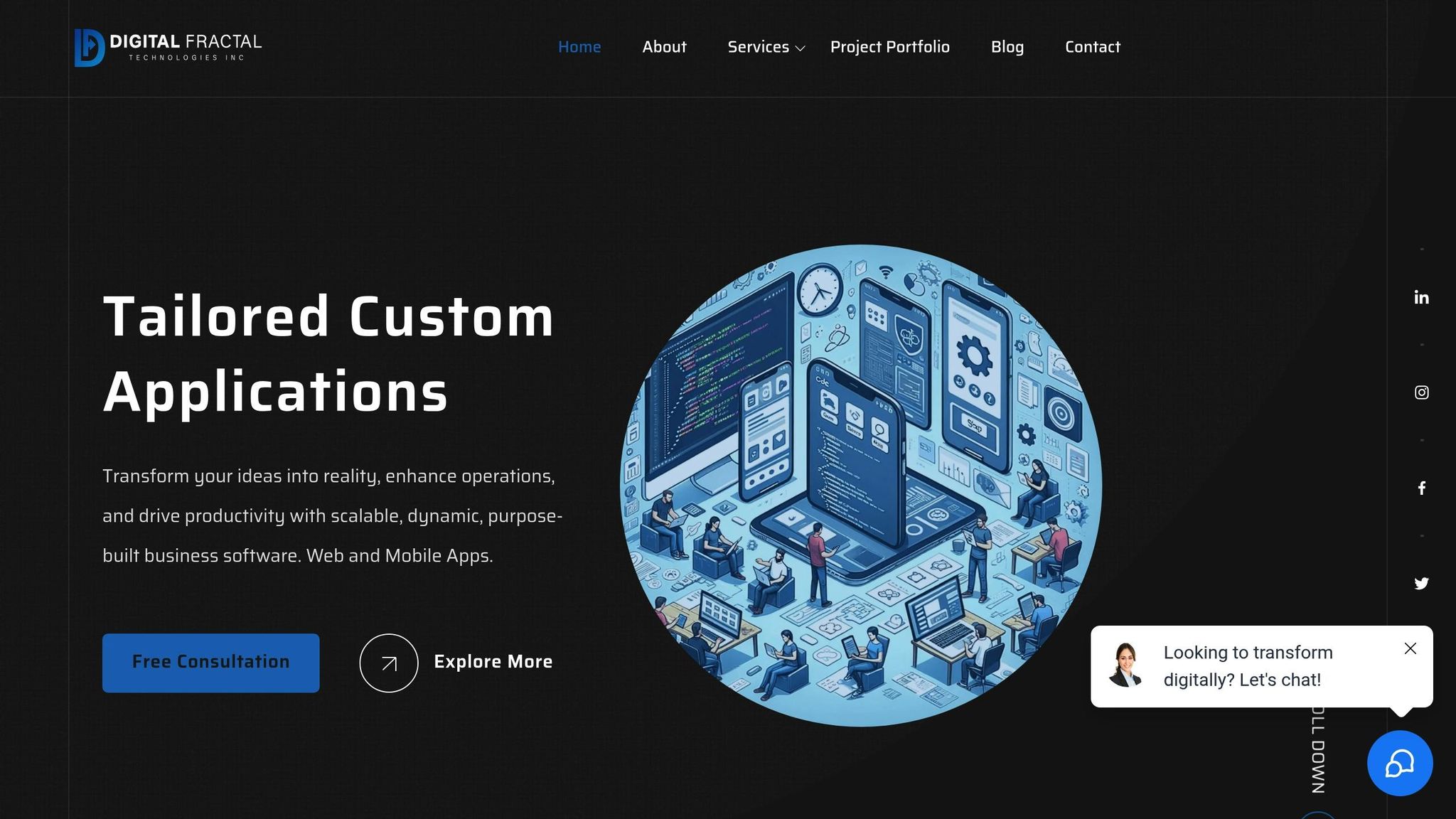
How AI Enhances Custom CRM Scalability
AI is transforming how businesses in Canada scale their custom CRM systems. Here’s how it works:
- Predictive Analytics: AI forecasts customer behaviour, identifies risks like churn, and improves revenue projections.
- Automation: Routine tasks like ticket routing and data entry are handled automatically, saving time and reducing errors.
- Personalization: AI delivers tailored customer experiences, from marketing messages to dynamic pricing, even in bilingual markets.
For Canadian businesses, AI-driven CRMs also address unique needs like PIPEDA compliance, bilingual support, and multi-currency transactions. Companies like Digital Fractal Technologies Inc are helping industries like energy, construction, and public services implement these scalable solutions to improve efficiency and customer satisfaction.
AI-powered CRMs provide flexible infrastructure, cost savings, and continuous learning, ensuring businesses can grow without sacrificing performance.
How to Design a Self-Managing CRM with AI (That Actually Works).
AI Technologies That Enable CRM Scalability
AI technologies play a crucial role in helping CRM systems grow efficiently. By automating complex tasks, predicting future trends, and delivering tailored experiences, they allow businesses to scale without needing additional resources.
Predictive Analytics for Business Forecasting
Predictive analytics equips your CRM to handle shifting business demands by using historical data to anticipate customer behaviour, flag potential risks, and estimate revenue trends. This is particularly useful during high-demand periods like Black Friday or back-to-school shopping seasons.
Machine learning algorithms dive into customer interactions, purchase histories, and seasonal trends to create accurate forecasts. For Canadian businesses, this means being better prepared for demand changes, ensuring customer service teams and inventory levels are ready when needed.
One standout feature is churn prediction. By examining signs like reduced engagement, frequent support tickets, or late payments, predictive analytics can identify customers at risk of leaving well in advance. This gives customer success teams the chance to step in with targeted retention strategies before it’s too late.
Revenue forecasting also gets a boost. AI analyses multiple factors – like customer lifetime value, seasonal buying patterns, and market trends – to provide detailed quarterly and annual projections. These insights help businesses make informed decisions about staffing, infrastructure, and technology investments to support future growth.
Automation for Streamlined Workflows
AI-powered workflow automation tackles common bottlenecks that arise as businesses scale. By making smart, context-aware decisions, automation handles tasks like lead scoring, ticket routing, and data entry, freeing up teams to focus on higher-impact activities.
For example, customer support automation uses natural language processing to address routine issues like password resets or billing questions. When more complex problems arise, the system ensures tickets are directed to the right agent based on their expertise, workload, and the customer’s priority level.
Meanwhile, data entry automation saves time by extracting information from emails, forms, and other documents to update customer records automatically. This not only improves data accuracy but also allows staff to concentrate on building relationships instead of managing administrative tasks.
Personalisation Engines for Better Customer Experiences
As your CRM grows, personalisation engines ensure that interactions remain meaningful and relevant. These engines use machine learning to deliver customised experiences to a large number of customers at once, maintaining the personal touch that builds loyalty – even as the business expands.
For instance, personalisation engines tailor marketing messages, product recommendations, and pricing based on individual customer data. In bilingual markets like Canada, AI can automatically adjust communications to match language preferences and cultural nuances, ensuring messages resonate with the audience.
Dynamic pricing engines are another powerful tool. They adapt pricing in real time based on customer segments, demand levels, and competitor activity. This approach not only maximises revenue but also keeps customers satisfied by offering pricing that feels fair and personalised.
Additionally, customer journey personalisation maps out tailored pathways for different segments. AI identifies the best touchpoints, communication channels, and timing for each customer type, creating seamless, individualised experiences. Managing this level of personalisation manually across a large customer base would be nearly impossible, but AI makes it achievable.
Together, these AI technologies – predictive analytics, automation, and personalisation – build a CRM system that grows intelligently with your business. They ensure operational efficiency, maintain customer satisfaction, and support sustainable growth without adding unnecessary complexity.
Benefits of AI-Powered CRM Scalability
Integrating AI into custom CRM systems goes beyond simple automation – it lays the groundwork for consistent growth and streamlined operations. These systems reshape infrastructure, reduce operational costs, and adapt to shifting market demands.
Flexible Infrastructure for Business Growth
AI-powered CRMs bring a level of flexibility that traditional systems often lack. They adjust effortlessly to evolving business needs without requiring a complete overhaul. Unlike older systems that may falter under heavy data loads or a growing user base, AI-driven solutions dynamically scale their processing power in real time.
Elastic scaling ensures your system can handle busy periods by allocating resources as needed and scaling back when demand decreases. This adaptability extends to customer service, where intelligent load balancing assigns inquiries based on factors like agent expertise, current workload, and customer priority. As your team grows, the system learns from these interactions, fine-tuning its approach to improve efficiency.
Cost Savings Through Optimized Operations
AI-powered scalability also delivers measurable financial benefits. By streamlining operations and improving resource allocation, businesses can significantly cut costs. For instance, Canadian companies have reported up to a 30% reduction in support expenses and a 40% boost in customer satisfaction. A Vancouver-based e-commerce retailer saw a 45% increase in marketing ROI, showcasing the tangible value of these systems.
Continuous Learning and Market Adaptation
AI-powered CRMs thrive on continuous learning, becoming smarter and more effective with every interaction. Machine learning models refine their performance over time, eliminating the need for frequent and costly updates. This adaptability ensures your CRM stays relevant and competitive.
For example, AI algorithms can identify market trends and adjust recommendations, pricing, and customer engagement strategies accordingly. Businesses using AI-driven predictive analytics have reported up to a 40% improvement in campaign performance. Faster response times, accurate lead scoring, and personalized interactions are just a few of the benefits.
Additionally, the system’s feedback loop reinforces successful strategies while phasing out less effective ones. Insights from past interactions shape future campaigns, driving better results. Canadian companies leveraging AI for digital marketing have seen 40% higher conversion rates and a 30% reduction in customer acquisition costs. This ongoing improvement ensures your CRM remains a strong foundation for scalable, AI-driven growth.
sbb-itb-fd1fcab
How to Implement Scalable AI-Driven Custom CRMs
Building an AI-powered CRM that can grow alongside your business takes careful planning. For Canadian businesses, this process comes with unique considerations like regulatory compliance, bilingual capabilities, and industry-specific needs. The path to success typically unfolds in three key phases.
Evaluating Your Scalability Requirements
Before diving into AI features, it’s essential to pinpoint what your business needs from a scalable CRM. As your company grows, your CRM must adapt to changing demands, making flexibility a top priority. > Scalability is a critical factor for CRM software, as business requirements change with growth, necessitating flexible functionalities.
Start by defining your business goals. Are you aiming to reduce customer support response times, boost sales conversions, or improve the efficiency of your marketing campaigns? > A well-suited CRM enhances operations and fosters growth for small Canadian businesses, with scale and industry demands influencing the choice. Take stock of your current processes and identify areas for improvement.
You’ll also need to estimate future growth in users and data while ensuring your CRM can handle real-time analytics. For Canadian businesses, compliance with PIPEDA and provincial privacy laws is non-negotiable. > Scalability ensures the CRM remains effective and relevant, adapting seamlessly to expanding business horizons, accommodating increasing data volume, users, and feature requirements.
Selecting AI Features for Your Business Goals
Once you’ve mapped out your scalability needs, the next step is to focus on AI capabilities that align with your business objectives and industry requirements. Not every AI feature will be equally useful, so prioritize based on your goals.
If improving forecasting and understanding customer behaviour is a priority, predictive analytics should be at the top of your list. This feature is especially helpful for industries like energy, where seasonal demand fluctuates, or construction, where project timelines depend on weather conditions.
Automation capabilities are another must-have, particularly for streamlining repetitive tasks. Think about workflows that consume the most time for your team – things like routing customer service tickets, qualifying leads, or scheduling follow-ups. Automation can free up time and deliver quick results.
For businesses focused on creating unique customer experiences, personalisation engines are invaluable. These tools analyse customer interaction history, preferences, and behaviours to deliver tailored recommendations and communications.
If your business serves both English and French-speaking customers, natural language processing with bilingual support is a game-changer. Beyond language needs, consider features specific to your industry. Public sector organisations may prioritise compliance tracking, while retail businesses might focus on inventory integration and purchase predictions.
Once you’ve identified the right features, you’re ready to move forward with expert integration.
Working with Digital Fractal Technologies Inc for Custom Solutions

Digital Fractal Technologies Inc specializes in building scalable, custom CRMs tailored to Canadian industries like energy, public sector, and construction. Their approach focuses on designing systems that grow with your business, eliminating the need for expensive replacements down the road.
The process starts with a detailed assessment of your current systems and long-term goals. Digital Fractal’s team evaluates your data structures, integration needs, and workflows to create a CRM architecture that supports seamless scaling.
Their AI consulting services help pinpoint the machine learning models and automation features that will deliver the most value for your business. Instead of adding every possible AI feature, they focus on solutions that directly address your challenges and growth plans.
With experience across various Canadian industries, Digital Fractal understands the regulatory and operational nuances involved. They build CRMs that manage bilingual content, comply with Canadian privacy laws, and integrate with widely used Canadian business tools and platforms.
Their custom software development ensures your CRM isn’t limited by off-the-shelf solutions. They design everything – from database structures to user interfaces and API integrations – specifically for your business processes, creating a solid foundation for both current operations and future growth.
On top of that, ongoing maintenance and support are central to their service model. As your business evolves and AI technology advances, Digital Fractal provides updates and enhancements to keep your CRM effective. Their expertise in workflow automation ensures your CRM integrates seamlessly with broader business systems, becoming the core of your customer relationship strategy.
Future Trends in AI-Driven CRM Scalability
AI-driven CRM systems are evolving rapidly, bringing transformative changes to how Canadian businesses manage customer relationships and scale their operations. These advancements aim to tackle challenges like language diversity, regulatory compliance, and the demand for instant decision-making, all while building on the AI capabilities already in use. Here’s a closer look at some key trends shaping the future of CRM scalability in Canada.
Natural Language Processing for Bilingual Support
Natural language processing (NLP) is advancing to meet Canada’s unique bilingual needs. Modern AI tools are moving beyond basic translation, focusing on understanding context, regional expressions, and subtle cultural differences in both English and French.
One standout development is real-time language switching during customer interactions. A customer might begin a conversation in English, switch to French mid-way, and the AI seamlessly keeps track of the context and history. This capability ensures smooth and effective communication across languages.
Another leap forward is in sentiment analysis for bilingual settings. AI systems can now interpret emotional cues, such as frustration or satisfaction, in both official languages. This allows customer service teams to prioritize and address issues more effectively. This is particularly valuable for public sector organizations and industries like energy, where diverse language preferences often come into play.
Voice recognition technology is also improving, with AI systems being trained on Canadian accents and regional dialects. These advancements even account for the way Canadians often blend English and French in conversation, enhancing the accuracy of phone-based support and voice-activated CRM tools.
Data Privacy and Compliance for Canadian Businesses
As privacy regulations become stricter, AI-powered compliance monitoring is becoming a must-have feature. CRM systems now include automated tools to ensure adherence to PIPEDA, Canada’s privacy law, by monitoring data practices in real time.
These systems can flag potential privacy breaches before they happen. For example, if a marketing campaign attempts to use customer data without proper consent, the AI can block the action and alert compliance teams. This proactive approach not only avoids fines but also builds trust with customers.
Data residency is another growing focus. Advanced CRM systems ensure that Canadian customer data stays within the country’s borders. AI algorithms can identify and segregate data based on criteria like citizenship or business location, which is especially crucial for government contractors and regulated industries.
Real-Time Analytics for Faster Decision-Making
With compliance becoming more automated, real-time analytics is emerging as a game-changer for decision-making. The growing use of edge computing in CRMs allows data to be processed closer to its source, delivering insights in milliseconds instead of relying on centralized servers.
Predictive alerts are becoming smarter and more actionable. For instance, AI can detect potential customer churn, identify new sales opportunities, or flag service issues within minutes. Teams can even receive notifications about possible delays when weather data signals disruptions.
Stream processing technology is enabling continuous data analysis. Instead of updating insights daily or weekly, CRMs now provide real-time updates on customer behaviours, sales forecasts, and operational metrics. For example, energy companies can adapt their customer engagement strategies based on live consumption patterns or grid conditions.
AI-driven automated decision-making is also becoming more advanced. Beyond simple rule-based actions, AI can now handle complex decisions like adjusting pricing strategies, reallocating marketing budgets, or prioritizing service requests based on factors like customer value and urgency.
The integration of IoT data streams with CRM analytics is unlocking new opportunities. For instance, manufacturing and construction firms can link equipment performance data to customer satisfaction metrics. This enables proactive maintenance and more accurate project timelines, making CRMs more responsive and scalable as businesses grow.
These advancements promise to redefine CRM capabilities. Canadian businesses that adopt these trends early will position themselves for stronger customer relationships and improved operational efficiency.
Conclusion
AI is reshaping how custom CRMs scale to meet the evolving demands of businesses. The tools we’ve discussed – predictive analytics, workflow automation, and personalization engines – aren’t just buzzwords; they’re practical solutions that boost customer engagement and streamline operations.
With adaptable infrastructure, cost efficiencies, and continuous learning capabilities, companies can stay competitive in fast-changing markets. These advantages are particularly relevant in Canada, where the bilingual environment and strict privacy regulations add unique layers of complexity and opportunity.
Looking ahead, advancements in bilingual natural language processing (NLP), automated compliance tools, and real-time analytics will further refine CRM capabilities. These technologies promise to make customer relationship management more efficient, responsive, and aligned with Canadian business needs, regardless of size or industry.
To fully leverage these benefits and prepare for future trends, partnering with the right implementation team is critical. Digital Fractal Technologies Inc offers expertise in custom software development, AI consulting, and digital transformation. With experience across industries like the public sector, energy, and construction, they specialize in creating scalable, tailored applications designed to grow with your business while staying adaptable to future technologies.
Integrating AI into scalable CRMs is no longer a luxury – it’s a necessity for sustained growth. By incorporating tools like predictive analytics and personalization, businesses can create CRMs that not only meet today’s challenges but also anticipate tomorrow’s opportunities. The real question is: how quickly can your organization embrace AI to enhance customer experiences and drive growth?
FAQs
How does AI-powered predictive analytics help Canadian businesses scale their CRM systems?
AI-powered predictive analytics is transforming how Canadian businesses expand their CRM systems. By delivering precise insights into customer behaviour, it allows companies to develop targeted marketing and sales strategies that scale seamlessly alongside their growing customer base.
With tools that automate tasks such as lead scoring and churn prediction, AI minimizes the need for extra resources. This makes it easier to handle larger datasets and manage increasing customer interactions. The result? Businesses can provide more responsive, efficient, and customized customer experiences – a key advantage for those looking to thrive in Canada’s competitive market.
What AI features should Canadian businesses focus on when adopting a custom CRM system?
Canadian businesses can benefit greatly by leveraging predictive analytics to anticipate customer needs more effectively, automation to handle repetitive tasks efficiently, and real-time personalisation to create tailored experiences for their customers. These strategies not only enhance operational efficiency but also boost customer satisfaction, helping businesses remain competitive in an ever-evolving market.
Additionally, incorporating emerging technologies like voice-enabled interactions and multichannel engagement can elevate customer communication. These tools make interactions smoother and more intuitive, creating meaningful connections. By focusing on these AI-powered capabilities, businesses can ensure their CRM systems meet local market demands while keeping pace with the latest technology trends.
How does AI support compliance with Canadian privacy laws in custom CRM systems?
AI plays a key role in helping custom CRM systems comply with Canadian privacy laws by ensuring secure data handling and addressing data residency requirements. It supports businesses in adhering to regulations such as PIPEDA and the Artificial Intelligence and Data Act (AIDA) by automating compliance checks, incorporating privacy-by-design principles, and streamlining data access and archiving processes.
With AI-driven tools, businesses can monitor privacy risks in real-time, making it easier to protect personal information and uphold regulatory standards. This means companies can safeguard sensitive data while confidently meeting their legal responsibilities in Canada.

